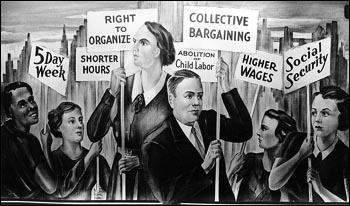 …an idea and article worth revisiting: a 2012 Dissent Magazine article by Century Foundation senior fellow Richard D. Kahlenberg and labor/employment discrimination attorney Moshe Z. Marvit, also authors of Why Labor Organizing Should Be a Civil Right: Rebuilding a Middle-Class Democracy by Enhancing Worker Voice.
…an idea and article worth revisiting: a 2012 Dissent Magazine article by Century Foundation senior fellow Richard D. Kahlenberg and labor/employment discrimination attorney Moshe Z. Marvit, also authors of Why Labor Organizing Should Be a Civil Right: Rebuilding a Middle-Class Democracy by Enhancing Worker Voice. The "union organizing as a civil right" concept, implicit in the Universal Declaration of Human Rights, appeared in 2008, reported by David Sirota in the Nation and elsewhere as "labor attorney Tom Geoghegan's 6 little words". Although widely cited at the time and still remembered by many, nobody took the idea and ran with it. Or so I thought until discovering the Dissent link in "The problem with Thomas Piketty: Capital destroys right-wing lies, but there’s one solution it forgets" (Salon) by Thomas Franks, author of What's The Matter With Kansas and Baffler founding editor. That solution would be unions and reforming labor laws:
It is time for supporters of labor to try an approach to reforming laborBoth article and book dropped below the fold and off everyone's radar. Maybe it was the timing and a hostile environment. Organized labor was taking major hits, even in traditionally labor friendly states. With more previously excluded groups organizing, taking action, gaining public approval — and influencing traditional labor unions that are taking notice of their success, that may be changing.
laws that does not involve a national conversation on the pros and cons
of procedures like “card-check”—which most Americans know little
about—and instead focuses on the fact that labor organizing is a civil
right and should be written into our civil rights laws. Title VII of the
Civil Rights Act, which extends the public protections for fundamental
rights articulated in the Constitution to the private sphere, is the
appropriate legislative vehicle to reform labor law. The result of an
amendment to the Civil Rights Act would be significant: just as it is
now illegal to fire or discipline someone for race or gender or national
origin or religion, it would be illegal under the Civil Rights Act to
fire or discipline someone for trying to organize or join a union.
SOME HAVE argued that organized labor is an anachronism and that its decline in the United States is due to economic and technological changes, like the advent of globalization. However, strong union movements in other industrialized democracies that are affected by these same changes show that story to be incomplete. Likewise, the notion that modern workers no longer desire to join unions is contradicted by evidence suggesting that, in 2007, 53 percent of non-managerial, nonunion workers would probably or definitely vote for a union if they could—up from 30 percent in 1984. If just one-quarter of those people unionized, the labor movement would double in size.And more...So what are you waiting for? Go read the whole article, Labor Organizing as a Civil Right | Dissent Magazine. Also by the same authors, "The Ugly Racial History of Right to Work"
No comments:
Post a Comment
pull up a soapbox and share your 2¢